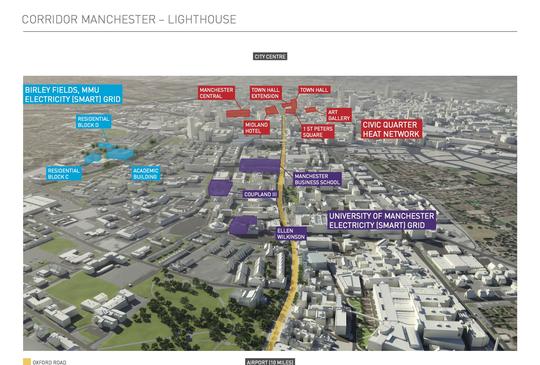
Manchester – the smart city
As part of the Triangulum consortium, which successfully beat bids from the likes of London and Milan, Manchester has teamed up with Eindhoven in the Netherlands, and the Norwegian city of Stavanger, with each conurbation creating low carbon districts as part of an EU scheme to drive Smart City development.
In Manchester a series of projects are being planned for The Corridor along Oxford Road, transforming the area into a Smart City innovation zone, the first district of its kind in the UK to bring together new ways of thinking around energy, heat and transport.
The project reflects the continued growth of cities, which the United Nations predicts will be home to 70% of the world’s population by 2050 – the figure passed 50% for the first time in 2008. Yet incredibly, despite using only 2% of the entire planet’s land mass, cities consume 75% of the world’s natural resources and account for nearly 80% of global greenhouse gas emissions.
To survive, cities increasingly need to be able to do more with less, with clean and efficient technologies set to play a key part in helping them achieve this.
All three partner cities have already made significant progress towards becoming Smart Cities by successfully restructuring former industrial economies into ones that are more knowledge and service orientated.
Selected areas will form the basis of living labs, zero/low energy districts which will then focus on integrating a range of technologies to reduce energy consumption. The zones will also provide a live ‘test bed’ for industrial partners who are looking at ways of increasing the use of renewable energies and electric vehicles, and of deploying intelligent energy management technologies.

Since the formation of the Corridor Manchester Partnership in 2007, the Corridor has already become something of a testing ground for new low carbon technologies. A number of major heat networks are already in existence supplying the estates of both The University of Manchester and Manchester Metropolitan University (MMU), while the Civic Quarter Heat Network was completed earlier this year.
Siemens will lead the energy-related aspects of the Triangulum project, connecting up a large number of local energy generation assets, electrical storage devices and buildings within the Manchester Corridor to a centralised control platform. This will enable the combined energy generated to be optimized and used in the most energy-efficient way. The platform will also identify both new sources of revenue and cost savings which will benefit Manchester’s inhabitants.
Sustainable logistics will form another element of the project, with a major push on reducing so called ‘last mile deliveries’ by van. The project team is looking at ways to better coordinate logistics, with suppliers delivering to a central hub on the Corridor before goods are then distributed by a more sustainable form of transport such as electric cargo bikes, saving money and reducing CO2 and congestion.
Ultimately, the delivery system could also be used to serve other businesses and SMEs along the Corridor and is also seen as dovetailing perfectly with long-term plans to remove cars altogether along the Corridor and develop new, high-end cycling infrastructure.
Of course, the partners along the Corridor have already been pro-active in introducing new energy efficiency measures, as part of Greater Manchester’s push to cut its GHG emissions by 48% by 2020.
At the Central Manchester NHS Trust, recent projects have included the installation of economisers on two main gas boilers. These recover energy from the flue gases and pre-heat the boiler feed water, which then requires less energy to raise the steam needed to heat the site.
A new multi-storey car park has also benefitted from LED lighting, with movement and daylight sensors ensuring an overall 50% saving compared to a system reliant on fluorescent lighting. As a result, the Trust is also looking at retrofitting our other multi-storey car parks with similar technology.
Sustainability is set to play a major role in the University of Manchester’s ‘Campus Masterplan’ which will see £1 billion invested over the next ten years, as the University radically reduces its carbon foot print. The University also remains a leading centre for research, with groups such as the Centre for Urban and Resilience and Energy (CURE) investigating how cities can adapt to climate change, while Living Lab has helped to turn the whole campus into a site for applied teaching and research around sustainability and low carbon, with recent projects spanning bio-energy to the importance of trees in our cities.
MMU, has been named the third greenest University, in the UK by the People and Planet University league with its Birley Fields campus leading the way in green design,including CHP plant and ground source heat pump, along with grey and rainwater harvesting.
Elsewhere across the MMU estate a new data centre at All Saints is using ambient air chilling, while PV panels have been added to three buildings, including the new business school, generating around 150,000kwh per year.
The project launched in Manchester on 11th February, followed by a kick-off meeting with partners from Stavanger and Eindhoven on 12th and 13th February.
For more information visit the Corridor website.
Vélocity victory: £20 million to support cycling in Greater Manchester
Contributed by Rachel Whelan
Contributor Profile
Mark Hillsdon is a freelance writer with a passion for nature and the great outdoors. A regular contributor to magazines such as Coast and CountryFile, he also writes on sustainability for the Guardian, and the occasional travel piece for the Independent. On Sunday. He has also been writing on all things Mancunian since first getting off the Euston train as a student nearly 30 years ago.




